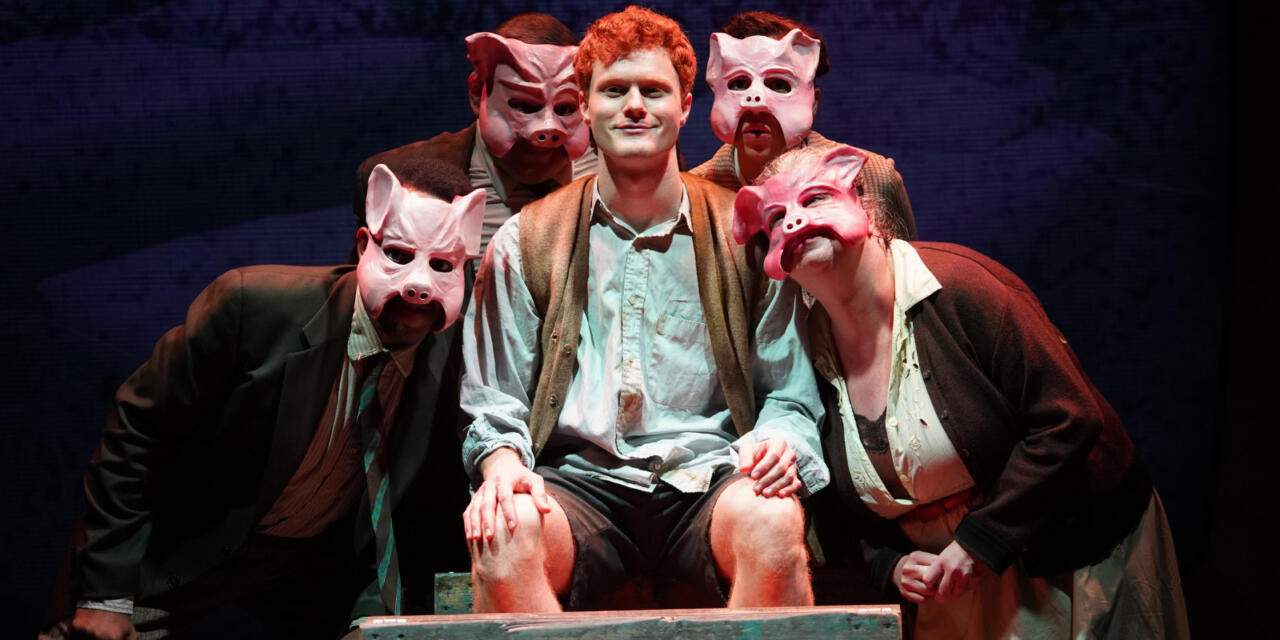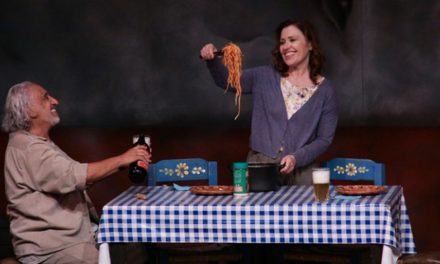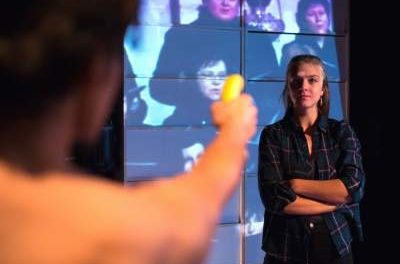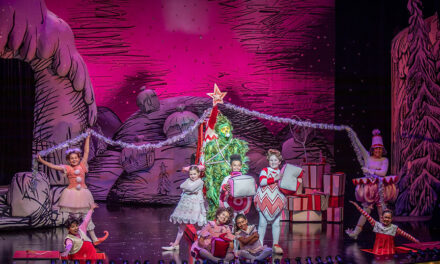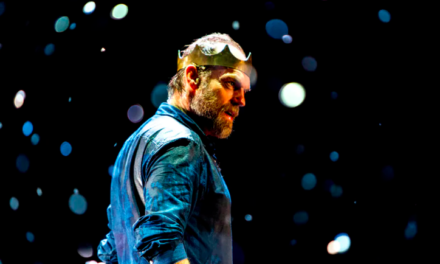This review contains spoilers. TW: suicide, homicide, mental illness
The Butcher Boy, which opened last week at the Irish Repertory Theater is deeply upsetting, but less so due to the gore it portrays, and more because of the sexism and tired tropes around mental illness it seemingly endorses. The show, written by Asher Muldoon and based on Patrick McCabe’s 1992 novel of the same name, tracks the downward spiral of 1960’s Irish teen Francie Brady (played by a charming, terrifying, clear-voiced Nicolas Barasch). While there may be reasons to explore psychosis through a combination of darkness and unsettling humor, this show does not give us any. Instead, it presents Francie’s downfall as inevitable and inevitably violent. I found myself asking, why do I need to see a show like this right now? Why do I need to see a show like this at all?
I felt uneasy almost immediately when the events of the show are set off by the suicide attempt (and eventual death) of Francie’s Ma (Andrea Lynn Green). Green does her best to avoid the hysterical woman trope, but there is so little depth to her material it’s evident that the show only cares about her insofar as how she affects Francie, and it’s hardly even interested in that. Mostly she is useful for her genetics, and existence, and then lack of existence.
One could argue that Muldoon flattens the Ma character because the show is told through Francie’s narrow and highly specific viewpoint. This would be a justifiable choice except every female character is similarly flattened whereas the male characters often get to show both their true selves and Francie’s callow view of them. Francie’s Da (Scott Stangland) is a rollicking song and dance man, but also a gruff abuser. Neighborhood boy Phillip Nugent (a hilarious Daniel Marconi) steals scenes and best friends with over-the-top tap dancing and an ever-growing bedazzled bow tie, but is also generous, timid, and gentle. Joe (Christian Strange) is the ultimate best friend, and also shows fear at Francie’s descent. In contrast, aside from Ma, there are three female characters who all share the same character traits of being saintly, beautiful, and wistful. That they also share a name, Mary (Kerry Conte), seems less like a clever bit and more like Muldoon telling on himself: at best he’s not good at writing female characters. At worst he doesn’t think it’s important to.
My deepest concerns however began at the start of Act II when Francie has been committed to a psychiatric facility. In the song “Buzz” we watch as a choir of ominous doctors, bathed in red and sporting fly eyes, administer Electroconvulsive Therapy (also known both as ECT and shock therapy) to treat him for his hallucinations of pigs. In addition to the demonization of ECT being tired and overdone (see One Flew Over the Cuckoo’s Nest, The Bell Jar, Next to Normal and others) it’s also extremely dangerous. I personally have known people (including some in my family) who have greatly benefited from ECT, but were reluctant to try it due to its portrayal in the media. Granted these procedures have improved a lot since the 1960s when the show takes place, but why in this day and age do we need more stigmatization of options that may help people in their healing process? ECT does not work for everyone and there are certainly conversations to be had about the ethics of its use, especially around consent and the often traumatizing effects of psych wards, but this show does not care for nuance. It is no more than shock treatment for shock value.
The stigmatization of mental illness only gets worse from there. The entire two-and-a-half-hour runtime we are waiting for Francie’s small-scale acts of violence to escalate to full-scale murder and in the show’s final moments they do. People with mental illnesses are statistically more likely to be victims of violent crimes than perpetrators and yet for some reason, it is still seen as fashionably edgy to tell stories about “crazy” killers. This does immeasurable damage by making it harder for mentally ill people to access resources, care, and support or even to speak about their struggles.
There are interesting questions to explore regarding the social roots and implications of both mental illness and violence. Is mental illness purely a biological/genetic condition or can it arise from the pain of living in a racist, capitalistic society (as is posited in Depression: A Public Feeling by Ann Cvetkovich)? In either case what sorts of community interventions are helpful in removing the burden off of the individual? What types of attempted care or narratives around it are actually more harmful? What can we learn from madness and is it possible to do so without romanticizing or exoticizing it? How do we learn how to live together?
The Butcher Boy sometimes gestures towards greater context– Francie’s Da is abusive, his family is seen as lower class (especially as compared to the much-loathed Nugents), and Francie himself reads to me as queer-coded and possibly isolated for that reason. Today young white men regularly terrorize communities so I can see why this might be a topic of interest. But none of these threads are investigated. Instead, Francie’s condition is seen as inherent and inevitable. Even when he tries to get help, hoping to win the “Francie Brady not a bad bastard anymore award” there is no escape.

Nicholas Barasch and Andrea Lynn Green in Irish Rep’s 2022 World Premiere production of THE BUTCHER BOY – Photo by Carol Rosegg.
And when the inevitable act of violence finally came I found myself simultaneously disturbed, amused, and bored because of course this show, whose events are instigated by the death of a woman with seemingly no internal life who we know next to nothing about, also ends with the death of a woman with seemingly no internal life who we know next to nothing about. I will confess that I laughed aloud at this conclusion because while the show seemed to suggest Francie’s murderous turn was inevitable, all I saw was the inevitably of male writers who treat women as disposable as they tell the stories of the supposedly more interesting male sociopaths who kill them. As Maggie Nelson puts it in The Art of Cruelty (a book that has much to say about violence and when/how it may be useful to explore in art) “Misogyny, when expressed or explored by men, remains a timeless classic” (197).
All of this brings me back to the questions I began with: why do I need to see a show like this right now? Why do I need to see a show like this at all? My answer is simple: I don’t. Clearly, though the Irish Repertory Theater thought it was worthwhile enough to invest in a set that includes not only a giant tv, but a turntable. I find myself thinking about the show’s writer, Asher Muldoon. While many of the reviews have been mixed to poor, nearly every article is quick to point out Muldoon’s indisputable talent and how especially remarkable it is given his youth. Many reviewers even incorrectly exaggerate his youth putting him at 19 instead of his true age of 23 (still an impressive age at which to have a show at a prestigious off-broadway theater but nonetheless).
Muldoon may go on to write amazing work, only time will tell, but I would not consider The Butcher Boy a foretelling of his self-evident talents. The show is competently written, but I can find nothing special about it. Instead, I think the narratives around Muldoon are the flipside of the narrative he created for Francie. At one end of the spectrum we have the inevitable solo male monster and at the other the inevitable solo male genius. Neither is seen as being shaped in any way by their community, and the support/opportunities they do or do not receive. Instead, they arise, as if out of nothingness, to impose their wonders and horrors upon the rest of us.
Despite my harshness, I do not begrudge Muldoon for writing a bad show or even for accepting the opportunity to have it put up. He is indeed young. Instead, I’m asking why he was given this opportunity in the first place. When will we demand more of our art and our artists? We are living in scary times. I do not think art needs to hold all the answers, in fact when it tries to it’s usually boring. But I do think that our world is shaped by stories so we owe it to ourselves and each other that the stories we tell are nuanced, thoughtful, and relevant to our current moment. I do think we should have an answer to the question “why do I need to see this right now?” Personally, I would love to see a horror musical that is genuinely scary, and shocking but does not fall into tropes of sexism or stigmatizing mental illness. I hope someone writes it. Maybe it will be Muldoon, maybe not. Either way, I’m excited to engage with art that focuses less on inevitabilities, and more on possibilities.
If you are struggling with mental illness you can call the National Alliance on Mental Illness Hotline at 800-950-6264
For resources around mental illness that focus on community care, anti-oppression, and disability justice check out the Fireweed Collective
This post was written by the author in their personal capacity.The opinions expressed in this article are the author’s own and do not reflect the view of The Theatre Times, their staff or collaborators.
This post was written by Morgan Skolnik.
The views expressed here belong to the author and do not necessarily reflect our views and opinions.

